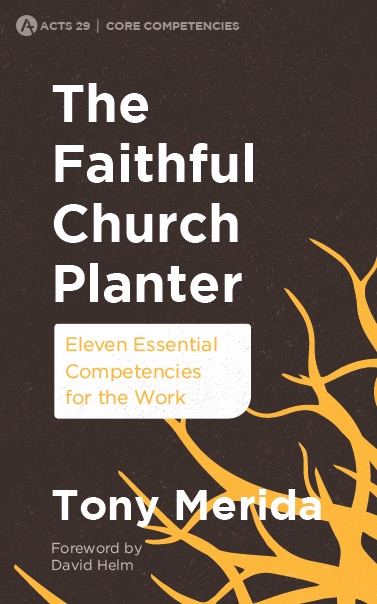
29 Oct One quality every church planter needs: Thoughts from Tony Merida
We are thrilled about Tony Merida’s upcoming new release The Faithful Church Planter: Eleven Essential Competencies for the Work and we trust that it will quickly become a staple in the church planter’s library. Tony Merida is a pastor, seminary professor and Director for Theological Training for Acts 29, a church-planting organization.
While many requirements for church planters come easily to mind, there is one that isn’t as obvious. In his new book, Pastor Merida asserts that entrepreneurship is an essential quality for those looking to plant a church that will stand the test of time. He has devoted an entire chapter to this idea and we have excerpted portions of it for you here:
I have been listening to a podcast called How I Built This (from National Park Radio). The host, Guy Raz, interviews leading entrepreneurs and innovators, digging into the stories behind their companies and movements. I’ve learned about the backstory of Sub Pop Records, Shake Shack, Fitbit, Sierra Nevada, and Five Guys, just to name a handful. It didn’t take long to detect that these entrepreneurs have several things in common with church planters.
Webster defines entrepreneurial as “having to do with the creation and development of economic ventures.” As a church planter, we’re not about the creation and development of economic ventures, but about the creation and development of new gospel ventures (for example, creating evangelistic initiatives, developing discipleship models, and starting new churches).
Church planters with entrepreneurial aptitude share many of the same abilities as other entrepreneurs. Good church planters are characterized by passion. This includes being a self-starter. It means being a disciplined, hard worker.
Additionally, effective church planters are resourceful. I often say, “Former drug dealers make good church planters!” (emphasis on ‘former’!). What I mean is that they’re streetwise and savvy. They know how to get things done with little resources.
Further, successful church planters display flexibility and creativity based on their context and opportunities. They cast a compelling vision, develop clear plans for reaching their specific area, and constantly evaluate their work, learning and making adjustments.
Moreover, effective church planters gather people. They can recruit others to join in the new work, including other leaders who are gifted in ways they aren’t. They build trust within their teams. They can also appeal to outsiders in a compelling way.
Finally, good church planters give attention to practical details. These include matters like childcare, security, parking, legal issues, fundraising, handling finances, building needs, details concerning corporate worship, communication, and so on. While they usually work with others on these issues, they don’t let them go unchecked.
If a fruitful church planter was on How I Built This, chances are that many of these traits would be mentioned. But the Christian leader understands behind our “building” is Jesus’ promise to build his church (Matt. 16:18). Christ, our Savior, gives us the abilities and opportunities, and strengthens us for his work in the world. So we can only boast in the Lord as the church grows and bears much fruit (1 Cor. 1:31; 3:6).
Pastor Merida goes on to offer Biblical support for this idea:
From Proverbs:
We are instructed on the one hand to avoid the sluggard’s way of life! The sluggard is characterized by a number of unflattering traits: indolence, inactivity, idleness, apathy, helplessness, harmfulness, excuse-making, procrastination, emptiness, and arrogance (see Prov. 10:26; 13:4; 15:19; 20:4; 21:25–26; 24:30–34; 26:14–16). Sluggards don’t plant churches! On the other hand, we are instructed to “consider” the ant in order to be wise (Prov. 6:6–11). Imagine the thought—being taught by a bug! But the ant gives a much better picture than the sluggard, illustrating what it looks like to work wisely, diligently, and taking initiative in every season.
From Ecclesiastes:
While the writer of Ecclesiastes (“the Preacher”, 1:1) laments the many difficulties of life, he often speaks of the value of work. We’re urged to throw ourselves into the tasks of life with energy and confidence. The preacher tells us about the difficulties in toil and the danger of overworking and having the wrong motives (4:4–8). Yet he states that we can still find enjoyment in our faithful labor (cf. 2:24; 3:13; 5:18–20; 8:15; 9:10).
From Matthew:
In Jesus’ parable of the talents (Matt. 25:14–30), we find another biblical example of being faithful stewards of all we’re given (see also Luke 19:11–27 for a similar parable). A talent was worth about twenty years of a laborer’s wages and represents specific privileges and opportunities for kingdom work. The first servant with five talents, and the second servant with two talents, took what was given to them, acted industrially, and earned a return (Matt. 25:16–17). They receive a “Well done” from the Master and are promised greater responsibility and stewardship in the life to come (25:20–23). However, the third servant took his one talent and hid it in the ground (25:24–25). He displayed laziness, fear, and poor stewardship, and consequently met the Master’s wrath (25:26–30). Jesus also adds that using our God-given abilities faithfully (like servants one and two) will result in further opportunities for kingdom work (25:29). So let us be faithful with all we have in view of the coming of our Master.
The author concludes:
Church planters with entrepreneurial aptitude have the skills to start and develop new gospel works. They are marked by characteristics like passion, hard work, and resourcefulness. They have the ability to gather people, cast vision, and give attention to practical details. They are flexible and creative as they consider how to engage various contexts with the gospel. In short, they are faithful stewards of all God has given them, and they make the most of the opportunities before them.
We tell our aspiring church planters, “We want to prepare you for a thirty-year run!” So what will keep us going? How can we be faithful to the end? This resource shows us what it looks like to start faithful and stay faithful in church planting ministry. Tony Merida draws wisdom from the Scriptures to show us the eleven key competencies that mark a healthy church planter. If you aspire to plant churches, whether you’re a seasoned pastor or a growing leader, The Faithful Church Planter will equip you to be deployed around the corner or across the globe, scattering gospel communities everywhere.
212 pages | $12.99 | £9.99 | Shop now

Tony Merida is Pastor for Preaching and Vision of Imago Dei Church in Raleigh, N.C. He’s also the Dean of Grimké Seminary and Director for Theological Training for Acts 29. Tony has written several books including The Christ-Centered Expositor and multiple volumes in the Christ-Centered Exposition commentary series. He’s happily married to Kimberly, and they have five children.


